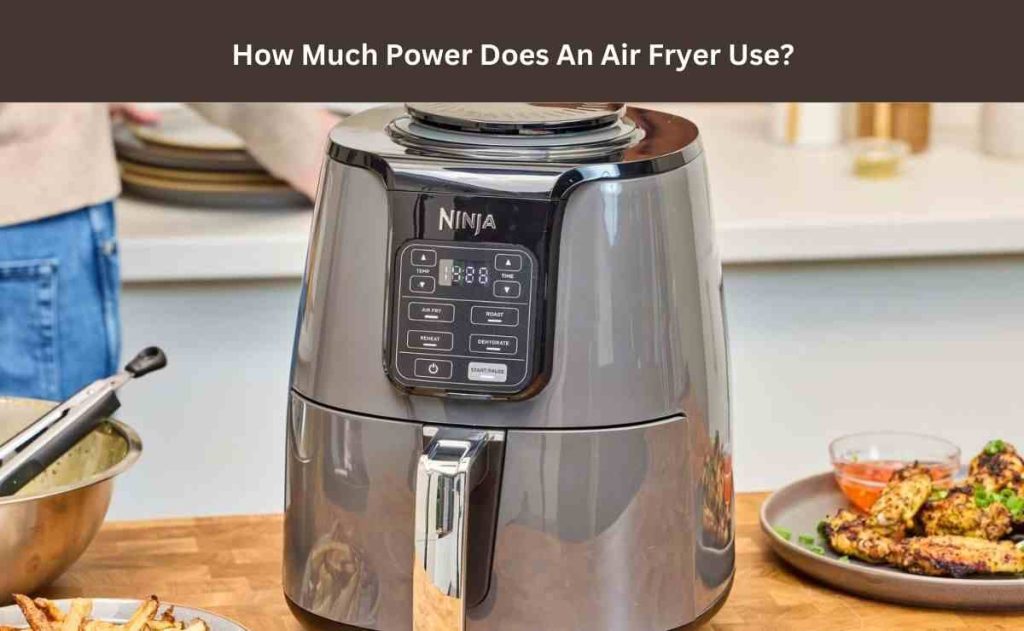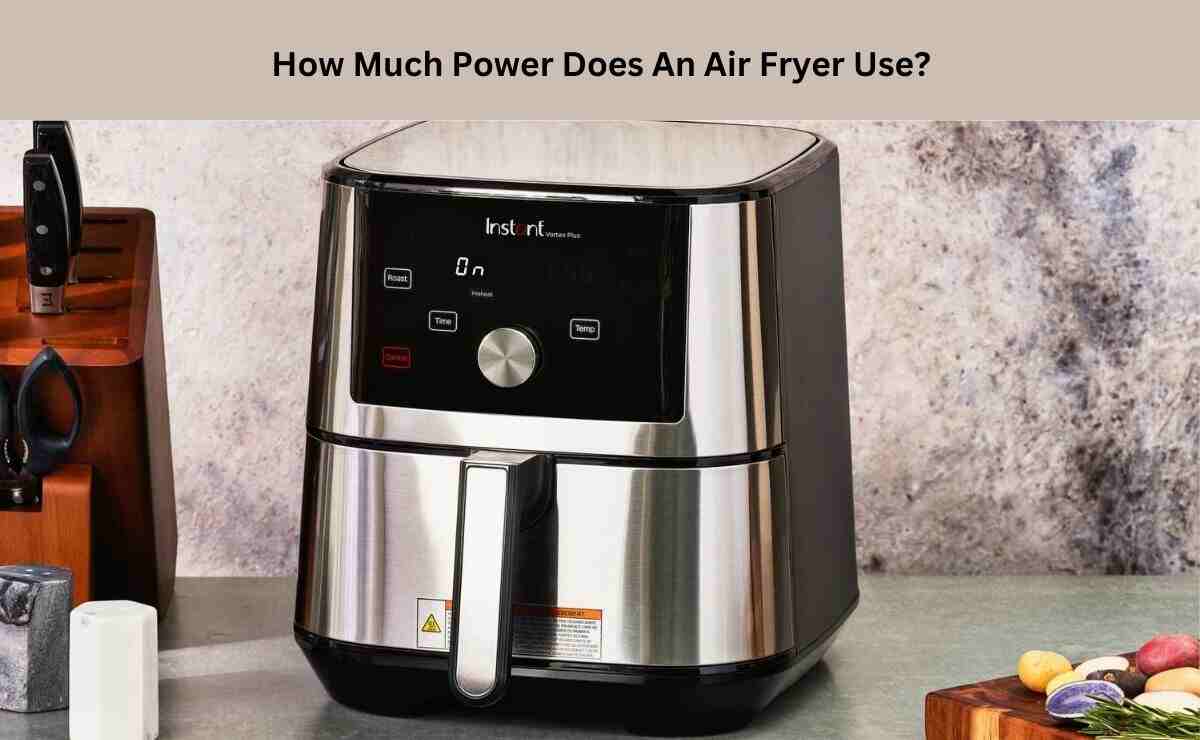Air fryers mean innovative technology that lets you enjoy the fun of frying food without additional calorie consumption. However, before buying one, you must know how much power does an air fryer use? Because electricity bills are a significant concern for many. So understanding the power usage of an air fryer becomes important for you.
On average, an air fryer can consume 800 to 1800 Watts of power. It greatly depends on the model and size of the fryer. Larger air fryers use more electricity while smaller ones use less power.
How Much Power Does An Air Fryer Use?

The power consumption of an air fryer can vary. It depends on its size and specific model. Generally, the power ratings of air fryers fall within a certain range. Here’s the average power consumption for different air fryers:
1. Small Air Fryer: Approximately 800 to 1,200 watts
Small air fryers typically have a capacity of around 1 to 3 quarts. These types of fryers are suitable for individuals or small households. They are ideal for cooking small portions of food. If you want to save money on electricity bills, then you can get a small fryer.
2. Medium Air Fryer: Approximately 1,200 to 1,500 watts
Medium-sized air fryers generally have 3 to 5 quarts capacity. It can accommodate slightly larger quantities of food. They are popular with small to medium-sized families.
Most home cooks prioritize the medium fryer as it has a good balance between power and cooking ability. It is compact but cooks more food than a smaller option.
3. Large Air Fryer: Approximately 1,500 to 1,800 watts
Large air fryers typically use more power than other types. They have a 5 to 7-quart capacity or more. It is suitable for larger families, food trucks, or when cooking for gatherings or parties.
It is more efficient for commercial use. Still, you can get one if you can handle the extra costs and cooking space.
Do Air Fryers Use A Lot Of Energy?
Air fryers are designed to be more energy-efficient. They can create extremely hot air with minimal electricity. This feature makes them a greener and more cost-effective option compared to traditional frying methods.
However, if you compare the power consumption with other kitchen appliances, then you will see that an air fryer uses less power than an electric or gas oven. They typically use 2000 to 5000 watts which is far more than an air fryer’s energy consumption.
As we said earlier, larger air fryers consume more electricity. But only the size of the appliance doesn’t impact much on power usage.
The theory is about how much time it takes to cook food evenly. Certainly, more foods need more time to cook and the amount of energy depends on that cooking duration.
What Factors Impact An Air Fryer’s Energy Usage?
Air fryers are energy-efficient cooking appliances, but several factors can still influence their energy consumption. There are some factors that impact your air fryer usage and energy usage.
1. Cooking Temperature
Your air fryer’s cooking temperature can have an impact on its energy consumption. Higher temperatures will generally require more energy to maintain, especially during the preheating phase.
Cooking at lower temperatures or using the air fryer’s lower heat settings can help conserve energy.
2. Frequency of use
The more frequently you use your air fryer, the higher its overall energy consumption will be. If you use the air fryer multiple times a day, cumulative energy usage can add up.
Being mindful of how often you use the appliance and combining cooking tasks can help reduce energy consumption.
3. Efficiency
The efficiency of the air fryer itself plays a significant role in energy usage. Higher-quality and more technologically advanced models tend to be more energy-efficient. When purchasing an air fryer, look for models with good energy efficiency ratings and reviews.
4. Food Quantity
The amount of food you cook in an air fryer can affect its energy usage. Cooking large quantities of food at once is generally more energy-saving than cooking smaller portions separately. If possible, batch cook or cook multiple servings together to optimize energy usage.
5. Manufacturing Quality
The build and construction quality of the air fryer can influence its energy efficiency. Well-designed appliances with good insulation and effective heat circulation mechanisms tend to use energy more efficiently.
6. Cooking Time
Longer cooking times will naturally consume more energy. While air fryers are generally faster than conventional ovens, reducing cooking times, you can further optimize energy usage by monitoring cooking times and avoiding unnecessary overcooking.
Tips to Save Energy When Using Your Air Fryer
In today’s world, energy conservation is not only beneficial for our wallets but also essential for reducing our ecological footprint. When using an air fryer, there are various smart strategies to save even more energy and cook sustainably.
There are some tips for your air-frying routine. By maintaining them, you can enjoy flavorful and crispy dishes while being environmentally conscious.
- While some recipes call for preheating the air fryer, you can cook many dishes without this step. By skipping preheating when unnecessary, you can reduce energy consumption and shorten cooking times.
- Preparing large quantities of food in one go not only saves time but also reduces the number of cooking cycles and overall energy usage.
- How you arrange the food inside the air fryer can impact cooking efficiency. Ensure that the food is spread evenly in the cooking basket. It allows proper air circulation and even cooking. Overcrowding the basket can lead to longer cooking times and uneven results.
- Thawing frozen foods before cooking in an air fryer can significantly reduce cooking time and, consequently, energy usage. Planning ahead and defrosting food in the refrigerator can be a great energy-saving strategy.
- Most air fryers come equipped with timer settings. Utilize these timers to avoid overcooking, as extended cooking can lead to unnecessary energy consumption.
- Each time you open the air fryer’s lid, heat escapes, and the appliance needs to reheat, which can waste energy. To retain heat and maintain a consistent cooking environment, avoid peeking inside frequently.
- Not all dishes require high cooking temperatures. Experiment with lower temperature settings, as many foods can be perfectly cooked at lower temperatures, leading to energy savings without compromising on taste.
- Implementing energy-saving cooking techniques can also contribute to energy conservation. For example, parboiling vegetables before air frying can reduce overall cooking time and energy usage.
Frequently Asked Questions (FAQs)
Does an air fryer use a lot of power?
An air fryer’s power consumption can vary depending on its size and model. On average, most air fryers consume between 800 and 1,800 watts.
How much power does an air fryer use compared to an oven?
The power consumption of an air fryer is generally lower than that of a conventional oven. As mentioned earlier, most air fryers have power ratings ranging from 800 to 1,800 watts.
Does an air fryer use more power than a microwave?
No, an air fryer does not use more power than a microwave. Air fryers and microwave ovens are both energy-efficient cooking appliances. But the air fryer is more efficient.
Conclusion
Air fryers offer a more energy-efficient and cost-effective cooking option. It is the best attractive choice for those looking to reduce their electricity bills and minimize their environmental impact.
When comparing air fryers to ovens and microwave ovens, air fryers still hold a favorable position in terms of power consumption. They use less power than conventional ovens and are competitive with microwave ovens in terms of energy efficiency.
